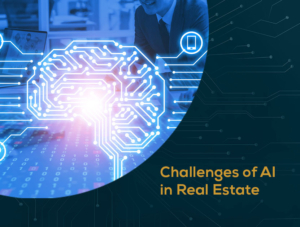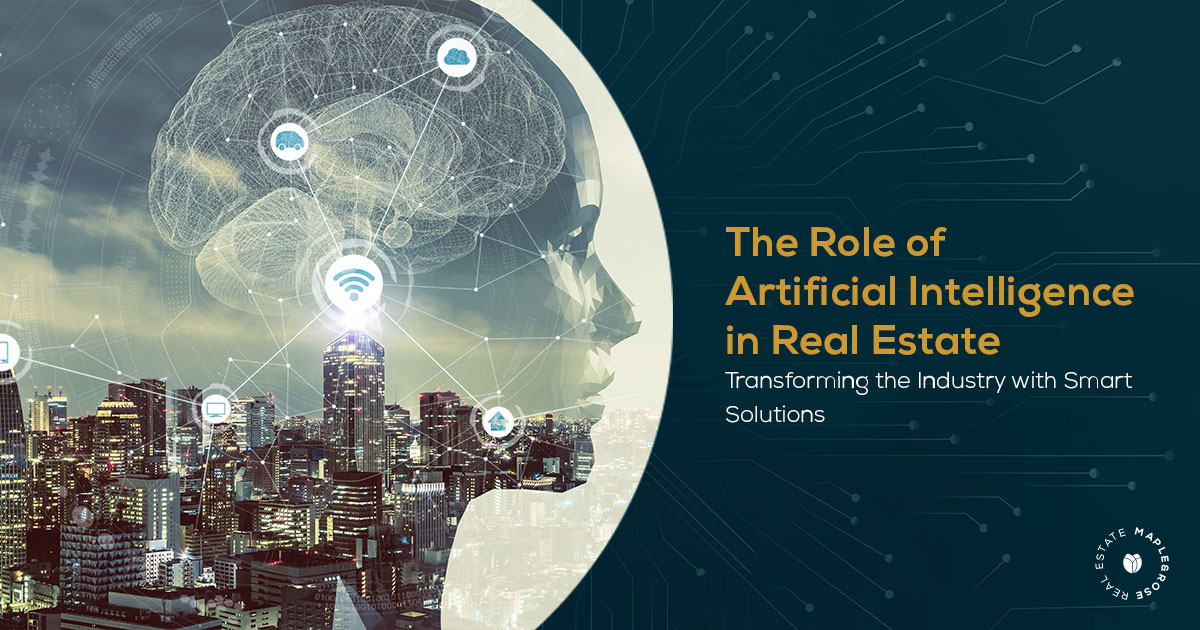The real estate industry has long been considered traditional and slow to adopt new technologies. However, the emergence of artificial intelligence (AI) has brought about significant transformations in this sector. AI is revolutionizing real estate by streamlining processes, enhancing decision-making, and improving customer experiences. Today, we explore the role of AI in real estate, analyzing its transformative power, benefits, and challenges.
How Artificial Intelligence is Transforming the Real Estate Sector

Let’s discover the awe-inspiring power of AI and the many ways it’s revolutionizing the concept of real estate as we know it.
Streamlining Property Search
AI-powered algorithms have revolutionized property search by providing more accurate and personalized results. Machine learning algorithms analyze vast amounts of data, such as property listings, historical sales data, demographic information, and buyer preferences, to generate highly targeted property recommendations. This enables buyers and agents to save time and effort in finding suitable properties, leading to a more efficient and satisfying experience.
Predictive Analytics for Investment Decisions
Real estate investors can leverage AI’s predictive analytics capabilities to make informed investment decisions. AI algorithms can analyze market trends, historical data, and economic indicators to forecast property values, rental yields, and potential risks. By providing valuable insights, AI enables investors to identify lucrative opportunities, optimize their portfolios, and mitigate risks.
Automating Property Valuation and Appraisal
Traditionally, property valuation and appraisal have relied on manual processes and expert opinions. AI-powered valuation tools employ machine learning algorithms to analyze property characteristics, recent sales data, market trends, and other relevant factors. This automation helps reduce human error, speed up the valuation process, and provide more accurate property estimates.
Virtual Reality (VR) and Augmented Reality (AR) for Property Tours
AI technologies like VR and AR are transforming the way buyers and investors experience properties remotely. Virtual property tours provide immersive experiences that enable individuals to explore properties from anywhere in the world. By visualizing the property’s layout, design, and dimensions, potential buyers can make better-informed decisions without physically visiting each property. This technology also benefits real estate agents by reducing the need for in-person visits and allowing them to showcase properties to a wider audience.
Smart Property Management
AI-powered solutions are enhancing property management by automating routine tasks and optimizing resource allocation. Smart buildings equipped with IoT sensors and AI algorithms can monitor energy consumption, predict maintenance needs, and enhance security. Additionally, AI chatbots and virtual assistants can handle tenant inquiries, schedule maintenance requests, and provide personalized recommendations, improving tenant satisfaction and operational efficiency.
Benefits of Artificial Intelligence in Real Estate

AI offers several benefits when applied to the real estate industry. The application of AI in real estate can enhance operational efficiency, improve decision-making, and provide a better experience for buyers, sellers, and real estate professionals.
Here are some of its key advantages:
-
Property Valuation
AI algorithms can analyze vast amounts of data, including historical sales data, property features, market trends, and comparable listings. By considering these factors, AI-powered valuation models can provide more accurate property estimates, helping buyers and sellers make informed decisions.
-
Lead Generation and Customer Engagement
AI can automate lead generation processes, identify potential buyers or sellers, and nurture customer relationships through personalized interactions. Chatbots and virtual assistants can engage with customers, answer their queries, and provide 24/7 support, enhancing customer satisfaction and improving response times.
-
Property Search and Recommendation
AI can improve property search experiences by understanding user preferences, analyzing their search history, and providing tailored recommendations. It can consider factors like location, budget, amenities, and personal preferences to match potential buyers with relevant properties more effectively.
-
Risk Assessment and Fraud Detection
AI algorithms can analyze large datasets to identify patterns that indicate potential risks or fraudulent activities. This can help real estate professionals detect and prevent fraud, such as mortgage fraud or identity theft, mitigating financial losses and maintaining trust within the industry.
-
Predictive Analytics and Market Trends
AI can analyze vast amounts of real estate market data, including historical sales, demographic information, economic indicators, and social media sentiment. By leveraging this information, AI algorithms can predict market trends, forecast property prices, and provide insights to real estate investors, helping them make data-driven investment decisions.
-
Property Management and Maintenance
AI-powered systems can streamline property management processes, including rent collection, maintenance scheduling, and tenant communication. Smart home technologies and Internet of Things (IoT) devices can be integrated with AI systems to automate tasks like energy management, security monitoring, and appliance control, improving efficiency and reducing costs.
-
Workflow Automation
AI can automate repetitive tasks, such as data entry, document processing, and contract management, freeing up real estate professionals’ time to focus on more complex and strategic activities. This automation can improve operational efficiency and reduce human errors, leading to cost savings and increased productivity.
Challenges of Artificial Intelligence in Real Estate

AI is an immense and powerful entity. While it is making our work faster and more productive, we must learn how to utilize and harness its potential the right way. This way we can mold its capabilities correctly for its successful implementation.
Here are some of the key challenges associated with using artificial intelligence in real estate:
-
Data Quality and Accessibility
AI algorithms heavily rely on vast and diverse datasets to provide accurate insights and predictions. However, ensuring the availability of high-quality data in real estate can be challenging. Real estate data is often dispersed across various sources, and inconsistencies or inaccuracies may exist. Additionally, obtaining access to comprehensive and up-to-date data can be a hurdle, especially when dealing with proprietary or restricted information.
-
Privacy and Security Concerns
Real estate transactions involve sensitive personal and financial information. AI systems need to handle this data securely to protect the privacy of individuals and comply with data protection regulations. Ensuring data security, implementing robust encryption, and adopting privacy-by-design principles are essential to gain trust and mitigate potential risks.
-
Ethical Considerations
AI algorithms can inadvertently perpetuate biases and discrimination if not carefully designed and monitored. In real estate, this could lead to unfair practices, such as discriminatory property recommendations or biased valuation assessments. It is crucial to implement ethical guidelines, diverse and inclusive datasets, and regular auditing to prevent such biases and ensure fair and transparent AI solutions.
-
Adoption and Integration
The real estate industry is known for its traditional practices and resistance to change. Adopting AI technologies may require a cultural shift, education, and training for professionals who are accustomed to traditional methods. Additionally, the cost of implementing AI systems and integrating them with existing workflows can pose challenges, especially for smaller real estate firms or individual agents.
-
Regulatory and Legal Implications
As AI becomes more prevalent in real estate, regulators and policymakers need to address the legal and ethical implications. There may be questions related to liability when using AI-powered valuation or recommendation systems. Transparency of AI algorithms is essential to ensure accountability and compliance with regulatory requirements. As AI technology evolves, regulations may need to be adapted to address emerging challenges and ensure responsible AI use in the real estate industry.
-
Limited Contextual Understanding
AI systems excel at processing large amounts of data and identifying patterns. However, they may lack a deep contextual understanding of specific real estate markets, neighborhoods, or cultural factors that influence property values. Human expertise and domain knowledge are still crucial to complement AI algorithms and provide nuanced insights.
Wrap Up
Artificial intelligence is transforming the real estate industry by revolutionizing property search, streamlining investment decisions, automating valuation processes, and enhancing customer experiences.
The benefits of artificial intelligence in real estate are numerous, ranging from increased efficiency and accuracy to improved transparency and customer satisfaction. However, challenges related to data quality, privacy, ethics, adoption, and regulation need to be addressed to ensure responsible and widespread AI adoption in the industry. As AI continues to evolve, its impact on real estate is likely to expand further, revolutionizing the way we buy, sell, and manage properties.








